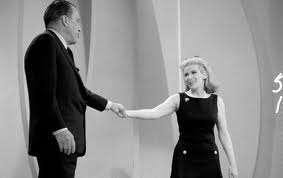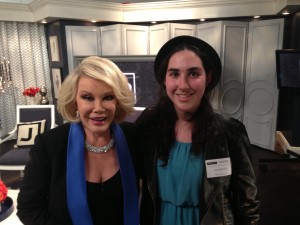(Editor’s Note: The following piece by Michael Bernick appeared in Fox and Hounds Daily on September 18, 2013. We are re-posting in memory of Ms. Rivers who passed away yesterday.)
California’s job specialists (and all of us) can learn much from studying the career and current employments of Joan Rivers—as demonstrated recently on the set of Ms. Rivers’ E! television show, Fashion Police.
In designing workforce strategies, or assisting job seekers, or in our own careers, we can learn from Ms. Rivers’ ability, even into her seventies and eighties, to pivot with show business trends. We learn from her ability to move on against regular setbacks, rejections, and failures. We learn from her willingness to perform in small venues and clubs, even after television and movie stardom. Perhaps most of all, we learn from her dedication to her audience–a dedication that is applicable across industry sectors.
The rich and lengthy history of Joan’s career is well-known. She began appearing in 1961 with Second City comedy in Chicago and at comedy clubs in New York. She joined Candid Camera in 1965 and performed on The Tonight Show with Johnny Carson in February 1965. Then followed regular appearances on The Tonight Show, as well as other television and movie performances, including this performance on the Ed Sullivan show in April 1967.
Throughout the 1970s and early 1980s, her popularity grew and employment opportunities were steady. Then in 1986 came the split with Carson, and the cancellation of The Late Show Starring Joan Rivers. Other rejections followed, but Joan never became too proud to work small clubs in Cleveland or upstate New York or suburban Wisconsin.
In the 2000s, she is back at the center of popular culture: appearances on Celebrity Apprentice (she won), The Simpsons, In Bed with Joan, and Fashion Police, to name just a few. She has found a new generation of fans, of which my youngest daughter Anna, is one of her biggest fans.
Recently, Anna and I went to a tapping of Fashion Police at E! Network. The set is a small one, only around 20-25 guests—though on television it sounds like three times that number, with the show’s energetic producer, Tony Tripoli. The taping is under a time constraint, as the studio is only booked from 8:00-11:30 in the morning, so the segments move quickly.
Around an hour into the taping, though, the cast and crew take a break. The three panelists on the show, Giuliana Rancic, Kelly Osbourne and George Kotsiopoulos immediately exit. But to the surprise of the audience, Joan comes to meet with us. She patiently takes photos with audience members, and answers questions. She has done this a million times before, but still makes us feel as if we’re very important to her.
Her answers are filled with sound employment advice. A young woman from Milwaukee tells Joan that she wants a career as an entertainment reporter. You need to get into entertainment news, not just talk about it, Joan tells her. Try to get an internship at E or some other news enterprise. Get in the door. To an aspiring comic from New York she explains that he should get out there and work the comedy clubs, and any place he can perform. Comics need to be prepared to spend years working in small clubs, before advancing to the next level.
Joan’s emphasis is on action, trying a new path if one is blocked, no complaining or feeling sorry for yourself. The advice reflects her own career, not only 50 years in Greenwich Village at The Bitter End or The Gaslight Café, but for the past decade, for today.
Joan’s achievements are not going unnoticed, as we discovered after leaving the taping. In the afternoon, Anna and I, with Michael Kelly of the Los Angeles Coalition for the Economy and Jobs, visited several policy think tanks: Zocalo Public Square, the Milken Institute, Beacon Economics.
At each stop, the journalists, researchers and economists want to hear about Joan. Gregory Rodriguez, Zocalo’s editor, praises the documentary, “Joan Rivers: A Piece of Work”, showing Joan as the hardest worker in Hollywood. Even the usually reserved Beacon lead economist Christopher Thornberg seems impressed that Anna had met Joan. All sense in Joan a different and deeper form of celebrity.
Hundreds of blogs are published each day with tips on finding a job through the right resume, interview, or contact. None teach us how to survive our coming winter of employment challenge as does Joan’s preternatural employment resilience.
Calling all “Joan Rangers”. Let us give our “Joan Rangers” salute to Joan, as the life force she is.



